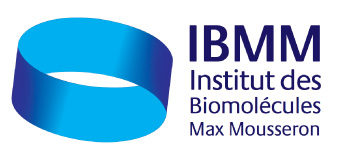Offre de thèse : PHOTOCLICK: Development of biorthogonal photo-crosslinking reactions for 3D printing micro-structured biomaterials
Contract: 3 years starting from October 2025
Application deadline: 04/07/2025
Location: Institute of Biomolecules Max Mousseron (IBMM), Montpellier, France and Institute for Molecular Systems Engineering and Advanced Materials (IMSEAM), Heidelberg, Germany
The project
This thesis project is located at the interface of click chemistry, photochemistry, materials, 3D printing and biology. The goal is to develop light-controlled chemoselective chemistry for 3D printing of micro-structured supports with applications in tissue engineering. 3D printing has boosted progress in this field by facilitating the manufacture of complex tissues, but printed structures do not yet faithfully reproduce the spatial heterogeneity and detailed architecture of human tissues, especially in terms of molecular composition and mechanical properties. It is therefore necessary to develop new strategies that offer precise spatiotemporal control of the properties of these 3D scaffolds.
PHOTOCLICK addresses this challenge by developing bioorthogonal photocrosslinking reactions allowing the fabrication of micro-structured bioactive scaffolds, capable of modulating cell-material interactions. The approach is based on chemoselective click reactions triggered by light by a 2-photon multi-wavelength system. This will include, for example, selective unmasking or the activation of one of the click partners by a specific wavelength. Using different wavelengths, we can photoselectively activate different photosensitive groups in a multi-component bioactive ink (peptides, proteins, biopolymers). This will allow the composition of the cross-linked material to be precisely defined at each point, with micrometric resolution, paving the way for the creation of scaffolds with bioactive patterns to direct cell growth and stem cell differentiation. This unprecedented control of stem cell behavior could lead to advances in the generation of organotypic multicellular tissue cultures (organ-on-chip), alternatives to animal models to test drug candidates.
The teams
The interdisciplinary project brings together two complementary international teams. The Peptides team at IBMM (Montpellier, France) is specialized in the synthesis of biomolecules and develops strategies to polymerize them to obtain bioactive hydrogels mimicking the extracellular matrix. The Selhuber-Unkel Group (Heidelberg, Germany) has recognized expertise in the manufacture of nano- and micro-structured biomaterials as well as in reactive and adaptive materials.
Doctoral training and mobility
The PhD student will have the opportunity to work in both laboratories, benefiting from an exceptional technological environment. He or she will alternate between Montpellier and Heidelberg (3-4 months/year). In Montpellier, the PhD student will synthesize and characterize photoactivatable molecules for 2-photon 3D printing. In Heidelberg, he/she will fabricate micro-structured scaffolds and study cell-material interactions. PHOTOCLICK will allow the PhD student to receive interdisciplinary training in chemical synthesis, advanced photochemistry and 3D printing and will contribute to the establishment of a new research collaboration between Montpellier and Heidelberg.
Skills
Organic chemistry, photo-triggered reactions, biorthogonal reactions
Characterization of molecules, polymers and materials
Knowledge in bioprinting and basics of biology will be appreciated
Autonomy
Critical thinking
Team work
Creativity
Applications:
Candidates should apply following this link before July 4th, 2025: https://emploi.cnrs.fr/Offres/CDD/UMR5247-GILSUB-004/Default.aspx
The position is located in a sector under the protection of scientific and technical potential (PPST), and therefore requires, in accordance with the regulations, that your arrival is authorized by the competent authority of the MESR.
